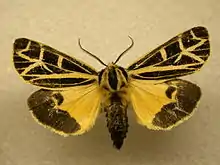Grammia anna
Grammia anna, the Anna tiger moth, is a moth of the family Erebidae. It was described by Augustus Radcliffe Grote in 1863. It is found from Maine to the mountains of North Carolina, west to Nebraska and Arkansas.
| Anna tiger moth | |
|---|---|
 | |
.jpg.webp) | |
| Scientific classification | |
| Kingdom: | Animalia |
| Phylum: | Arthropoda |
| Class: | Insecta |
| Order: | Lepidoptera |
| Superfamily: | Noctuoidea |
| Family: | Erebidae |
| Subfamily: | Arctiinae |
| Genus: | Grammia |
| Species: | G. anna |
| Binomial name | |
| Grammia anna | |
| Synonyms | |
| |
The wingspan is 40–53 mm. The forewings are black with thick and thin yellowish to cream-colored lines. Forewing pattern includes two to three pale lines extending inward from the costa. The hindwings are bright yellow with a broad black border and a black spot near the costa. Adults are on wing from May to July.
The larvae feed on a wide variety of low-growing plants, including clover and plantain.[2]
References
- "930245.00 – 8176 – Apantesis anna – Anna Tiger Moth – (Grote, 1864)". North American Moth Photographers Group. Mississippi State University. Retrieved August 8, 2018.
- Butterflies and Moths of North America
- Pitkin, Brian & Jenkins, Paul. "Search results Family: Arctiidae". Butterflies and Moths of the World. Natural History Museum, London.
This article is issued from Wikipedia. The text is licensed under Creative Commons - Attribution - Sharealike. Additional terms may apply for the media files.